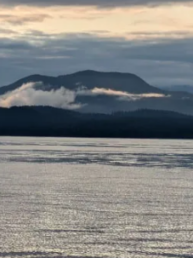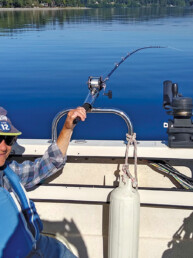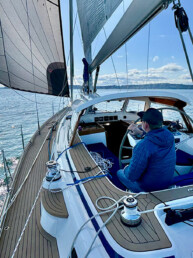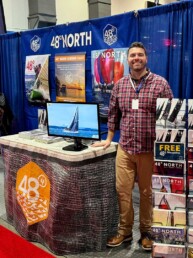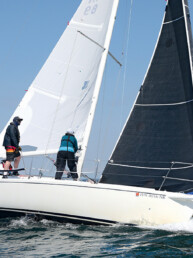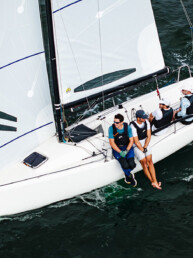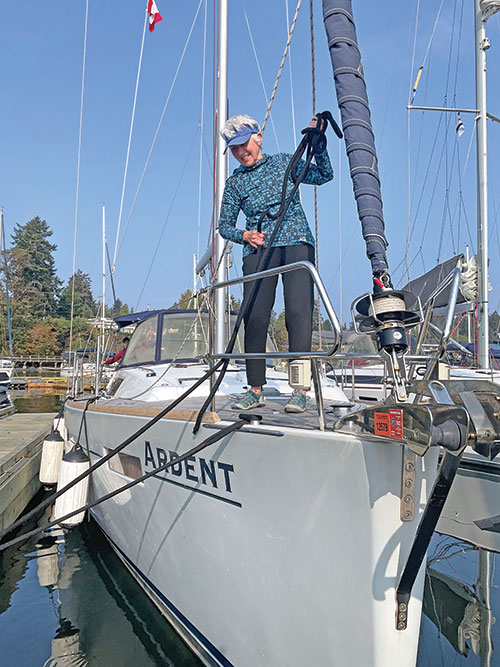
Students and mentors affiliated with the Oregon Women’s Sailing Association (OWSA) came together in September 2022 to charter boats and cruise to the Gulf Islands in British Columbia. The idea grew organically when a couple of skippers spread the word among their OWSA sisters that they were going, and a flood of interest in chartering poured in. Each skipper reserved the boat herself, found crew, and made all the arrangements independently. Twenty-seven OWSA women filled five boats.
There were first timers in all roles: first time chartering, first time skippering a chartered boat, first time crewing and handling a larger boat, first time sailing out of the U.S., and more. First timers were in company with experienced OWSA sailors on board, so everyone had support and an opportunity to participate. That’s how we learn from each other.
We had already learned how to make the boat go in previous OWSA classes on the Columbia River, but now where to? How to? What’s next? What if someone doesn’t own a boat, or if she wants to try out another kind of boat, or if her own boat isn’t trailerable or appropriate to some new location for adventure? Experiencing chartering was the logical next step.
After a good deal of research, our cruise flotilla motivator, Julie Demaree, a long time OWSA member and teacher, found charter boats with just the right touch of support; not too much, not too little. Details of planning the itinerary for the 7-day guided cruise, including border crossings to Canada and back, were provided by San Juan Sailing in Bellingham. They have a large, varied fleet of well maintained boats available. Routes were recommended, but each boat could choose its own way, supplied with daily knowledge of weather, tides, currents, and with both electronic chartplotter and paper charts. Every evening, we came together to exchange experiences, enjoy each other’s company, and prepare for the next day.
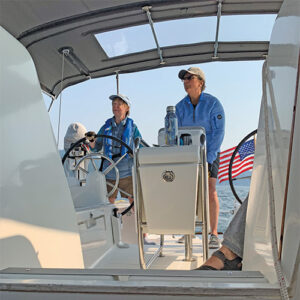
In our group there were four Jeanneaus and one Beneteau, all in the 40+ foot range, each with three staterooms and two heads. They were very spacious and came complete with safety gear, tender, VHF, well equipped galleys, linens, cleaning supplies, and full tanks. All we had to bring was our gear and food, which was easy to find in port. Included in the larger flotilla were four other boats with crews whom Captain Dave — our guide from San Juan Sailing — was teaching.
On a Friday in early September, we all arrived in Bellingham and boarded our boats. Ours was the lovely Ardent, a 41-foot Beneteau. Our skipper was the OWSA Chief Instigator, Julie, and the crew was Bernadette, Debra, Elaine, and me. We ranged in age from 40-something to 80 years and were a happy crew, each having her own strengths and experience that balanced well with the others. OWSA members in general cover a full range of ages. The other OWSA skippers were Stephanie, Julie S., Teresa, and Gail. There was lots of excitement as we stowed things and toured each others’ boats, and it carried into a dinner at the dock-side pub.
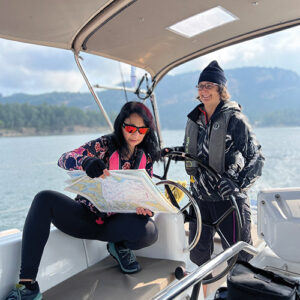
The following day, a company skipper took each boat and crew out to brief us and to see if we really did know port from starboard and could dock the beasts. I remember having docked larger boats only twice before; once when we were the only boat coming into an empty 200 foot dock, the other time was a ‘Med-moor’ (stern-to) and I had a good coach at my elbow. We were in for a real learning experience.
After this practice, we all headed out in calm conditions north through Hale Passage. It was a long motor directly to South Pender Island’s Bedwell Harbour to check into Canada at the docks in front of Poets Cove Resort. No messing about — we wanted to get there.
Getting used to the boat was the first order of business. We had chosen September for the lower charter rates, with the promise of some good late-summer weather. Our first travel day didn’t disappoint. Even though there was no wind, we ran out the sails anyway for practice. Ardent had an in-mast furling mainsail, which required careful attention when coordinating the tension between the outhaul and furling line in order to prevent wrinkles when bringing the sail in. Happily, we had no jammed sails during the trip.
Dockhands met us at Bedwell Harbour and skipper Julie went up to check us in. Going through customs was quick and easy since she had us all pre-registered with Canada Border Services using the app Arrive Can — a highly recommended option.
On Sunday, we headed to Otter Bay on North Pender Island via Plumper Sound. It was sunny and the wind was light, so we hauled out the sails and enjoyed an easy ride. Our chosen route was the long way around the island so we could see the sights. Up through Navy Channel there was some current, but nothing that slowed us much. Entering Otter Bay, we were suddenly aware of a small ferry that zipped in and out. I was at the helm a lot that day and the skipper asked me to dock the boat. Through a cozy fairway, Ardent, with her tender hanging 6 feet off the stern, proceeded to the assigned half-full double slip for 37-footers. Yikes. With guidance from dockhands and roving fenders ably handled by our crew, I docked that sucker! Woop-woop!
In the evening, Captain Dave gave us all a wonderful grilled salmon dinner up on the viewing platform overlooking Otter Bay. There was music from folks who brought guitars, ukuleles, drums, and other instruments. We sang and danced and watched the sun go down. Glorious day!
With dockhands guiding us again that next morning, I took the boat out. There was more applause from generous on-lookers. You know, the ones who always seem to be on hand to watch the docking show.
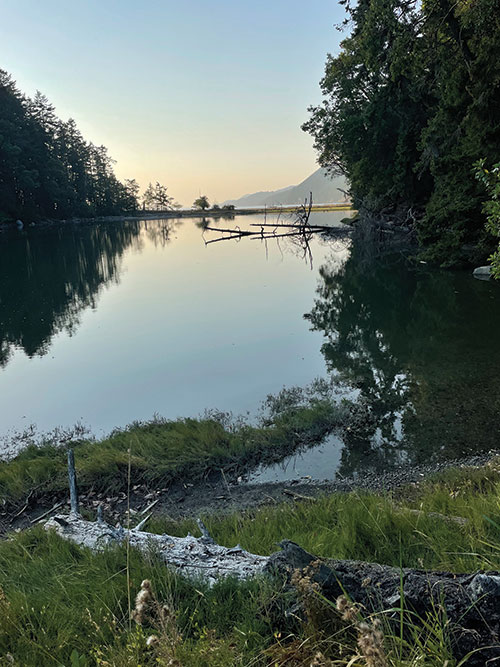
We headed for Montague Harbour Marine Provincial Park on Galiano Island and, after exiting Otter Bay, we crossed the top of Swanson Channel to stay out of the way of some traffic then made sail. We sailed all the way up through Captain Passage via the southwest side of Prevost Island and up through Trincomali Channel with good wind. Upon entering the lower end of Montague Harbour, we furled our sails and motored in onto a mooring ball at the Provincial Marine Park. Tip: most of the mooring balls are sprung so you can pull the rings up to deck level and pass the line through; other rings are not sprung so it was a challenge to reach down far enough to tie on. We ended up going to a different mooring ball after struggling with our first choice.
Once secure, we lowered the dinghy, started the outboard, took a tour around the bay, paid our nominal fee, and went for a walk in the beautiful park. Dinner was at the Hummingbird Pub up in the forested hills of the island and we rode the famous, riotous school bus up to the pub and back — truly an experience not to be missed.
From Montague we headed for Ganges on Salt Spring Island. Exiting from the north end of the harbor, we tried sailing again in Trincomali Channel but there was little wind. In Ganges, our slips were waiting for us and docking was straightforward. By this point, we were all getting a lot of practice at the helm and wanted more, but dinner in the town was beckoning. Ganges has a lot to offer with good food, a farmer’s market, and first-rate ice cream.
Ganges was our last stop in the Gulf Islands and we were off the next day to Roche Harbor via Swanson Channel again, across Boundary Pass leaving Stuart Island to port, and entering Roche Harbor from the north between Pearl Island and Henry Island. The last few days had been very clear and fresh, but we were starting to see a little wildfire smoke. Julie easily checked us in with US Customs, but the Customs agent wanted to see me. I had forgotten to sign my brand new passport. Thank goodness the crowds were gone, the Customs agent was not under pressure and he had a sense of humor. We had our last party on the dock and celebrated our journey together with more good potluck food, music, and singing into the beautiful night.
The routes back to Bellingham varied. Some boats went south through San Juan Channel, through Upright Channel and then to either Obstruction Pass or Thatcher Pass. Our crew and a couple of other boats headed past Deer Harbor on Orcas Island, through Cayou Channel (formerly Harney Channel), leaving Shaw Island to starboard. It was a very interesting motor; lots to see on the nearby island shores. After a stop at Blakely Island, we exited the San Juans through Peavine Pass. Out in Rosario Strait, we picked up some good wind and really made some speed. The furling main didn’t seem to like the big wind and we had to work out some wrinkles. Entering the bay below Lummi Island, many of the boats chose to practice anchoring out for the night in Chuckanut bay, with plans to come into Bellingham in the morning. We chose to go into the home dock and we later heard that most of the boats had to reset their anchors that night.
I can’t say enough good things about my sailing companions: Elaine and Deb were always so steady and ready; Bernie with loads of sailing experience and, wow, can she cook; Julie with the energy of 10, solid sailing skills, and an inspiring sense of adventure. What a team! Julie commented that when you get strong women personalities together who are also accomplished sailors, you can have a great time. And how true that was for this OWSA charter cruise on the Salish Sea!
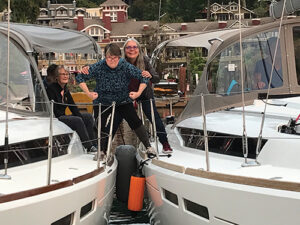
Since 1994, Oregon Women’s Sailing Association’s mission has been to empower women of all ages over 18 to sail wherever they wish to go. Members gain a foundation of basic sailing skills upon which to build confidence to make their dreams come true. OWSA has always encouraged students to seek further training and experience by giving them a good head start at a fair price. With this successful individually organized group charter experience, OWSA’s mission again has been achieved. It is like a circle — members come to learn to sail and to network, go out and make their dreams come true, then come back to help empower the next generation. Plans are underway for another charter flotilla in 2023.
Carol Baker calls Portland home, except when she is sailing her Flicka out of Olympia. She’s been involved with OWSA since 2010. Learn more at owsa.net

